

by Leo Wiles
27 February 2019
Whether you’re a graduate, have just been handed a redundancy package or simply have a burning desire to work for yourself, this must-read post on starting out as a freelancer is for you. We asked a range of seasoned professionals for their top tips, and here’s what they said…
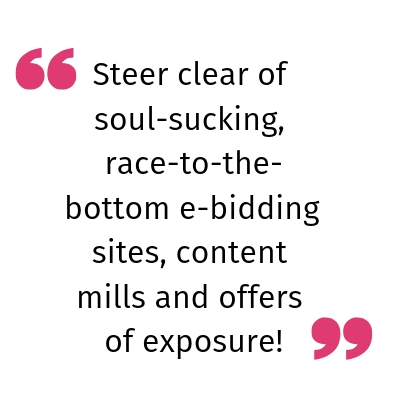
Emma Lovell, Lovelly Communications “Just do it. I’ve met so many people who have got stuck in the ideas and planning stage crippled by decisions about their branding, website, business name… and not even started to work with clients. When really it’s getting the work and doing the work that makes the business. So set up your website – it’s an online business card, then call those clients you want to work with. It doesn’t have to be perfect in the beginning. Just get started – or you’ll never do things. It took me two years to add a new page to my website because I wanted it to ‘look good’. That was two years of not being able to offer that service. So instead of spending three months picking a name, work under your name then go out there, get the clients (referrals are best) and then – just do it!”
Rachel Lees, Writer “Don’t work for free. Cafes don’t give out free burgers. Plumbers don’t fix leaky taps for free. Hairdressers don’t have ‘get your first cut free’ offers. Why? Because they have rent to pay, and so do you. Besides, not only does working for free devalue your work, it also devalues the work of our industry as a whole.”
Michelle Ives, copywriter “I believe in differentiating yourself by going above and beyond for your clients. I’ll remember birthdays, anniversaries and even due dates for their babies being born – and I’ll send them a little gift or drop them a line to let them know I’m thinking of them on it. This shows them that the relationship we have isn’t just transactional to me, and that fundamental human-to-human connection can help you stand out massively.”
Lisa Cugnetto, writer, editor and content producer “Build relationships, be reliable, sell your services at a respectable rate and trust your gut – if something feels off, it probably is. Seek out peers, communities and sites (like Rachel’s List) that offer support and knowledge and realise that having wins and losses along the way is just part of the ride.”
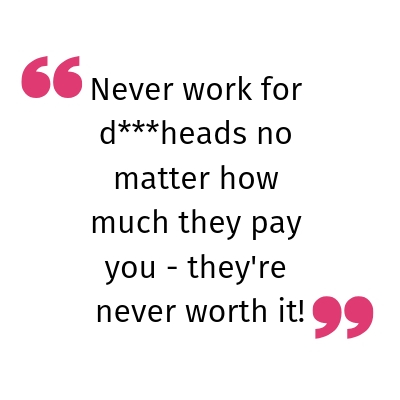
Rachel Smith, journalist, copywriter and content creator “Get organised from the start. Be visible online. SEO the hell out of your website. Pitch like a mofo. Do stints of work in-house if you can to make contacts, hone your skills and network. Ask for testimonials. Don’t be shy about letting people know what you can do – share your work online, send an email to your contacts list and engage with others in your niche so they can get to know you.”
Ellen Hill, Deep Hill Media “Don’t believe the doom and gloom about the industry – this is your chance to carve your own niche, be ethical and ensure accountability and high standards. Because you are now first and foremost a business person who must network, market and sell yourself. Only after that should you start writing/shooting/producing/PR’ing etc.”
Freya Herring, journalist “Know your worth. If a story is going to take you three days, charge for it. $300+ per day is what subs are paid to freelance in offices, so a day of your time is worth $300+ too. The bottom line is if you are being paid $300 for a story then you can’t afford to spend more than a day on it.”
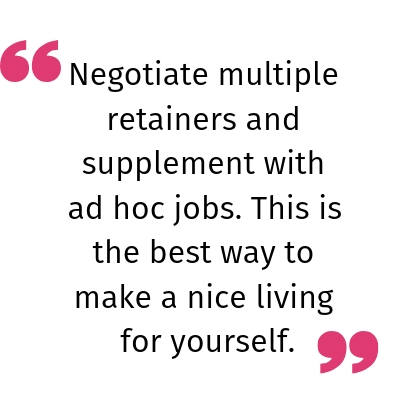
Lana Head, writer “After writing each article, take a few moments to think back about what worked really well and what didn’t work so well. It helps you develop your interviewing and writing skills and practices. Also, stop pitching before holidays … or be prepared to decline work or work on your holiday. I got my first major commission two days before I went to Fiji for a family holiday. It was a great problem to have, but it did complicate things.”
Rashida Tayabali, copywriter “Be careful of spending too much money on business essentials and remain professional from the start with a decent website, portfolio and by registering for GST.”
Erin Delaney, writer and web designer “Know your capacity and respect your limits so you can do a great job of being you out there in freelance-land. Whatever you do don’t overcommit if you receive more than one offer at once. It can be tempting to try to cram lots of assignments in but you might end up doing lacklustre work, running late or something goes wrong in your life and the stress of trying to explain it to multiple clients can be full on. The biggest lesson I learned was how to say no, even when I really didn’t want to. Because once you wind up in one of those kinds of situations, you never want to repeat it!”
Vivienne Pearson, writer “I have two pieces of advice 1. Get organised (even just a little bit and even if this is not your forte!). Keep a track of all your pitches and commissions, including the unsuccessful ones. It can be a simple list or spreadsheet – it doesn’t have to be fancy just as long as you keep it up to date. 2. Do a course (or two or three). But don’t get into lured into the false mindset that you can’t start until you’ve learned everything that there possibly is to know.”
Annie Reid, Atrium Media “Get a business coach or mentor who can give you the right advice straight up. I would have saved a lot of time if had professional help from the get-go. And be passionate and proud of your work. It’s very special to do what we do, so enjoy the ride.”
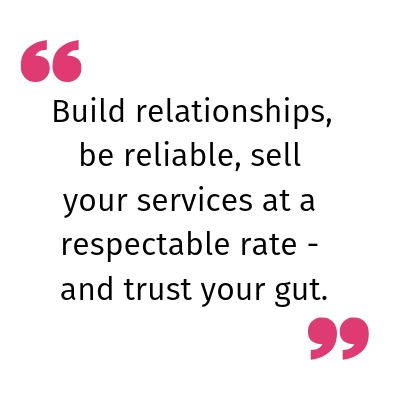
Mary Kiley, writer “Get everything you’re entitled to. If you work in-house using the employer’s equipment, you might qualify as an employee for that period. If so, you’re entitled to super. Don’t let the company tell you you’re not – they can’t make you sign away your rights. There’s a checklist on the ATO website. But keep in mind that, if you’re an employee, you can’t claim expenses as a freelancer.”
Bronni Page, health and wellness writer “Celebrate every little win along the way, and craft yourself an ‘elevator pitch’ so you can easily explain what it is you do to those well-meaning friends and family that think you should get a ‘real’ job…”
Bek Lambert, Unashamedly Creative “Don’t listen to fear mongers. There’s always someone telling you what sucks and is bad. Most of the time, they’ve no idea what they are f***ing talking about.”
Laura Greaves, journalist and author “Keep paying into your super! I just made my first contribution this month after TEN YEARS without paying a cent.”
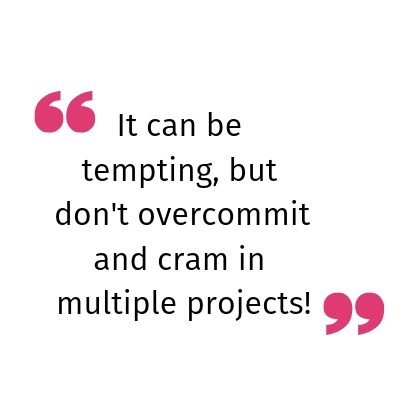
Hannah Bee, writer “Learn how you work and plan your work around it. If you’re better at taking information in the morning but prefer to create in the afternoon, structure your work day around that. But if you can’t switch on until after 10am, just build your workday around that – I’d recommend dedicating one day per week to just experimenting with ways of working. I.e. I prefer to stand in the morning and research and communicate with clients but after lunch, I enter a zone of writing so block that time out and bolt down in a corner. Having some semblance of a routine helps you as it saves you having to think about how to structure your day – and it gives you something to rebel against if you need to!”
Alison Hill, writer and editor “Have enough savings to cover a few months’ expenses because payments can go wrong and turn up late. Work dries up sometimes unless you’re really lucky and things can get lean. Make payments into your super fund when you can. Put your tax in a savings account every time you get paid.”
Nicole Leedham, copywriter “Steer clear of soul-sucking, race-to-the-bottom e-bidding sites, content mills and offers of exposure. Establish a website, do some basic SEO, network like a demon and clients will find you.”
Briar Jensen, writer “Establish an email signature with contact details, (sounds obvious but is sometimes overlooked), and always be polite. Being easy to work with and well mannered gets you a surprisingly long way.”
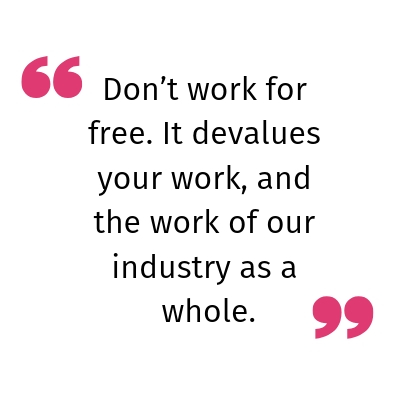
Lucy E. Cousins, writer and editor “Get organised – have a database of contacts, an article tracker (or system to keep deadlines in priority), a separate email just for work, and make sure your LinkedIn reflects what and who you want to write for. Think about future pitches when you’re interviewing experts and think of your time as money. Don’t forget to add in research and editing time into your quotes – unless you’re being paid by the word. In addition, if you’re a social media addict, consider putting any compromising photos behind a private account. Depending on what industry you write for, you will get stalked at some point.”
Leo Wiles, writer and photographer “Take the opportunity to learn and improve wherever you can. When starting out as a freelancer I’d read my features in print with a pen marking up any changes the subs had made. Comparing the printed versions to my submitted copy really honed my skills as a writer and showed me the importance of adhering to a housestyle’s tone and word choice.”
Lynne Testoni, writer and editor “Media rates are way too low, [which meant] I undercharged a lot in that first year. When you deal with corporates you can charge a lot more and they are more appreciative as well. I started by putting the word out there talking with friends who worked in my writing niche of interiors/lifestyle/food and someone put my name forward for a small gig with Monier Roofing, doing a quarterly brochure for them. It’s grown from there. I do four case studies a month for them now. I have about four regular clients, plus the mags and lots of one-off articles or website content for various companies. Most of my work is word-of-mouth as I found that all the marketing managers in that space talk to each other. They are all looking for good content too – they all have websites and are hungry for SEO-friendly articles that their audience likes to read. It’s really the same sort of work I used to do for glossy magazines in their heyday. Also, get your finances sorted. I invested in a cloud-based accounting system – QuickBooks – and it was the best thing I ever did. It adds everything up, makes invoicing a breeze and works out my GST. I love it. It’s so easy to use as well.”
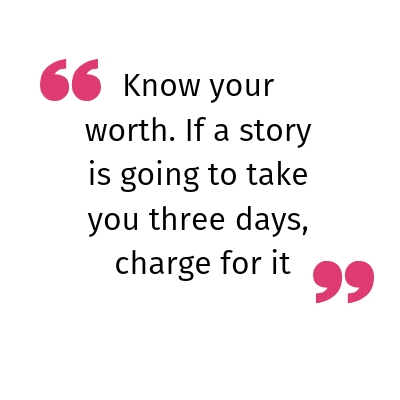
Carla Beth Anderson, copywriter “Run your own race. There are lots of people with advice of varying quality, but it’s really important to acknowledge the context of your own business too: family, health, other work, your own past experiences and passions can all have an impact on your time and energy. Find your own path and acknowledge – and celebrate – all steps that move you towards your goal.”
Jessica Wynne Lockhart, writer “Before you even register your business, hire an accountant who specialises in working with creative professionals or freelancers. Even if you’re a whiz with numbers, they’re well worth the cost.”
Joanne Hawkins, writer and editor “Don’t put all your eggs in one basket. Write for different clients and do not rely on what you’ve done in the past.”
Amal Awad, journalist and author “Have a speciality or three, whether it be in trade or mainstream journalism. It’s immensely valuable to have a portfolio that shows solid experience in specific areas, especially for trade writing.”
Natalie Archer, writer, content strategist and PR consultant “Once you gain some momentum, try to work towards a secure business model. Negotiate multiple retainers that you can supplement with ad hoc jobs. This is the best way to make a nice living for yourself doing what you love. (Oh, and never work for d***heads no matter how much they pay you – they’re never worth it).”
Angela Tufvesson, journalist, editor and content creator “Keep it simple and focus on always delivering clean copy, on time and to brief.”
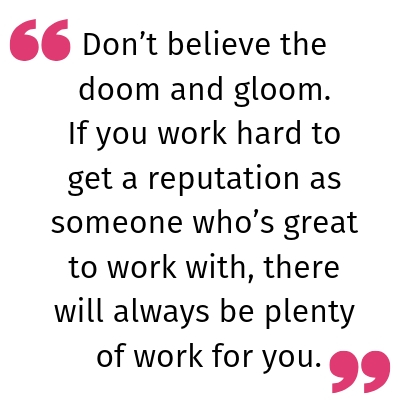
Michelle Meehan, editor, journalist and communication specialist “Undercharging is one of the areas I struggle with as a freelancer so mixing up writing for traditional outlets while working with lucrative corporate clients is a good idea.”
Jeanette Severs, journalist “Ask for a (preferably high resolution) PDF copy of the work you do. I always make that part of the deal. It is relevant because websites close or get ‘reconfigured’ and therefore links to the work you’ve done get lost/taken off the web. It’s always good to have a portfolio of PDFs to select from for new/potential clients to view. Plus it’s a nice thing for you to have in your files.”
Megan Blandford, writer and author “Don’t believe the doom and gloom. If you work hard to get a reputation as someone who’s great to work with, there will always be plenty of work for you.”
Jo-Anne Hui-Miller, journalist and editor “You’re not just a creative anymore, you’re running your own business, so start believing in yourself and get hustlin’ & pitchin’!”
Got a tip for starting out as a freelancer? We’d love to include it on this list – just comment below or email us. (If you loved this article you might want to take a look at our eBook: 25 Scripts for Freelance Success. It’s an awesome resource for conversation starters, dealing with scope creep and more…)
Stick with it. I’ve been a freelance writer for four years now. The first two years I hardly made any money and now I’ve got so much work rolling in I’m flat chat. Diversifying has also been useful – besides writing articles, I write advertorials, blog posts and run writing workshops in the Kimberley. Living somewhere remote can mean you miss out on a lot of networking opportunities, but it also gives you an instant niche. I’m often approached for my in-depth knowledge of the Kimberley region and local Indigenous affairs. So if you want to move to a tropical paradise and write, go for it!
That’s so great to hear, Leah! Go you 🙂